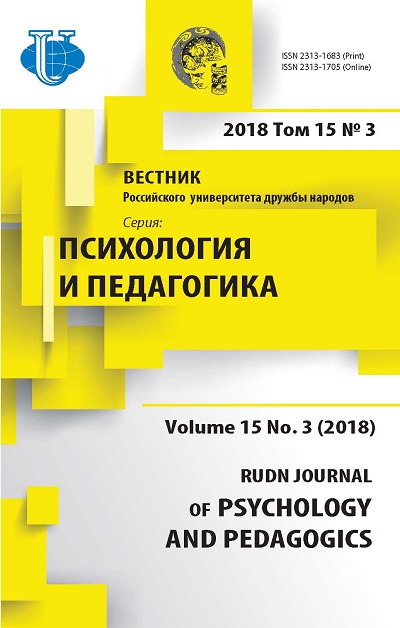MOTHER TONGUE OF ROMA CHILDREN FROM SPECIAL SCHOOLS
- 作者: Kyuchukov H.1, New W.2
-
隶属关系:
- University of Silesia in Katowice
- Beloit College
- 期: 卷 15, 编号 3 (2018)
- 页面: 323-333
- 栏目: PSYCHOLOGICAL AND PEDAGOGICAL PROBLEMS OF HIGHER EDUCATION
- URL: https://journal-vniispk.ru/2313-1683/article/view/347466
- DOI: https://doi.org/10.22363/2313-1683-2018-15-3-323-333
- ID: 347466
如何引用文章
全文:
详细
作者简介
Hristo Kyuchukov
University of Silesia in Katowice
Email: hkyuchukov@gmail.com
Ph.D. in Education, Dr. Sc. Of Education and Linguistics, Professor of General Linguistics, University of Silesia in Katowice 12, Bankowa str., Katowice, 40-007, Poland
William New
Beloit College
Email: newb@beloit.edu
Ph.D. in Education and Psychology, Professor and Chair, Department of Education and Youth Studies at Beloit College 700, College str., Beloit, WI 53511, USA
参考
- Cummins, J. (1984). Disabling minority students: Power, programs and pedagogy. Toronto: Ontario Institute for Studies in Education
- Gindis, B. (1999). Vygotsky’s vision: Reshaping the practice of special education for the 21st century. Remedial and Special Education, 20(6), 333-340
- Grigorenko, E. L. (1998). Russian “defectology”: Anticipating Perestroika in the field. Journal of Learning Disabilities, 31(2), 193-207
- Harry, B. & Klingers, J. (2006). Why are so many Minority students in Special Education? Understanding Race & disability in school. NY: Teachers Colleague Press. Horváth and Kiss v. Hungary, Application no. 11146/11, Council of Europe: European Court of Human Rights, 29 January 2013, available at: http://www.refworld.org/cases,ECHR,511cf1982. html (accessed 4 December 2017)
- Justin, E. (1944). Lebensschicksale artfremd erzogener Zigeunerkinder und ihrer Nachkommen [The Life History of Alien-raised Gypsy Children and Their Descendants]. Veröffentlichungen aus dem Gebiete des Volksgesundheitsdienstes. Schriftenreihe aus dem Arbeitsgebiet der Abteilung Volksgesundheit des Reichsministeriums des Innern. LVII Band - 4 Heft. Berlin
- Kozulin, A. (1990). Vygotsky’s psychology: A biography of ideas. Cambridge, MA: Harvard University Press
- Kyuchukov, H., de Villiers, J., & Tabori, A. (2017). Why Roma children need language assessment in Romani. Psychology of language and communication, 21 (1), doi: 10.1515/plc-2017-0011
- Kyuchukov, H. & Weiß, J. (2017). Educational research regarding Sinti children in Nazi Germany and its consequences in contemporary Europe. In H. Kyuchukov & W. New (Eds.), Languages of resistance: Ian Hancock’s contribution to Romani Studies (pp. 326-342). Munich: Lincom
- Morgan, P.L., Farkas, G., Hillemeier, M.M., Mattison, R., Maczuga, S., Li, H., & Cook, M. (2015). Minorities are disproportionately underrepresented in special education: Longitudinal evidence across five disability conditions. Educational Researcher, 44(5), 278-292. doi: 10.3102/0013189x15591157
- Open Society Institute (2007). EU monitoring and advocacy program: Equal access to quality education for Roma. Vol. 1. Bulgaria, Hungary, Romania, Serbia. Budapest: Open Society Institute
- OSI Report (2010). Roma children in “Special Education” in Serbia: overrepresentation, underachievement and impact on life. NY: OSI
- Samko, M. (2017). Linguistic ideologies of Roma mothers and languages of their children. In H. Kyuchukov & W. New (Eds.), Languages of resistance: Ian Hancock’s contribution to Romani Studies (pp. 354-362). Munich: Lincom
- Vygotsky, L.S. (1987). The collected works of L.S. Vygotsky, Volume 2: The fundamentals of defectology. Edited by R. Rieber and A. Carton. NY: Springer Science and Business
- Winzer, M. & Mazurek, K. (1998). Special education in multicultural context. Upper Saddle River, NJ: Prentice-Hall
补充文件








